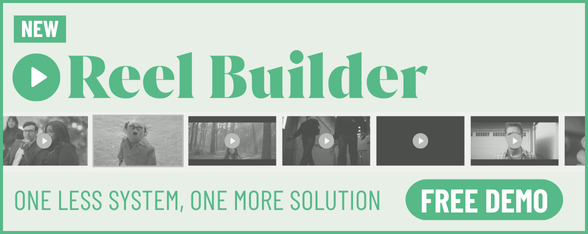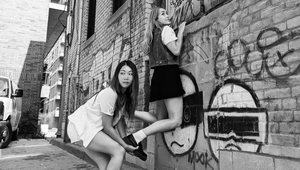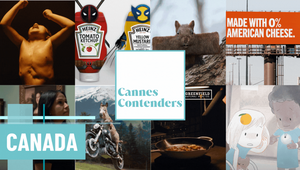
Launching an Agency in the Middle of a Global Pandemic

Leaving a job to set up an independent company is risky business any time. Doing it in the middle of a global pandemic that's having huge effects on people's health and the global economy - well, that's certainly something else to think about.
But that's exactly what Carlos Moreno, Jay Chaney, Denise Rossetto, Todd Mackie and Beverley Hammond are doing. This group of Canadian advertising veterans have launched Broken Heart Love Affair, an agency with the simple mission to "inspire everyone to fall in love with brands again”. To coincide with the launch, they penned a love letter to the advertising industry (which you can read further down this page)
Broken Heart Love Affair is a partnership of some of the most decorated Strategists and Creatives in Canada. Jay has served in strategy roles at Cossette, Lg2, Tribal DDB, Critical Mass, and Blast Radius, and has worked on the successful SickKids campaigns. Most recent he was CMO at fintech firm KOHO. He'll serve as the agency's chief strategy officer.
Carlos, Denise and Todd will serve as chief creative officers. Carlos is a Cannes Lions Grand Prix winner and was most recently the global chief creative officer at Cossette. Denise spent five years at BBDO prior to jumping ship to launch Broken Heart Love Affair. This year she ranked in the top five of Strategy Magazine's Creative Report. As did Todd, who before Broken Heart Love Affair spent five years as the co-chief creative officer at BBDO Toronto.
Beverley is the agency's chief business officer. Previously she started empathy marketing agency, Republic, and previously spent 12 years as President & CEO then Chair of Veritas Communications.
Nowadays they are all colleagues and partners at Broken Heart Love Affair but, in reality, they haven't been able to spend one day in the office together yet.
Addison Capper was keen to know more about both the agency and the experience of launching it during such an unprecedented time. He chatted with Carlos, Jay, Denise, Todd and Beverley to get the full story.
LBB> I wanted to ask you about the name first. It's pretty dramatic! What's it inspired by?
Carlos> The name came from the tension that the entire company was formed on.
This statement paved the way to our name:
“We are in love with an industry that’s constantly crushing our fragile hearts. It’s exasperating. It’s demoralizing. It can hurt so much. But, we push through. We know what is possible, what greatness feels like. Maybe it’s all very romantic, but we’ve all been there before. We’ve seen with our eyes and felt with our own hearts just how a simple and powerful idea can transform people, solidify communities, and build markets. How it can excite some of the most cynical of industry people and inspire the most jaded of clients. It can make icons of mere mortals. There’s a magic in the potential that stirs our passion. It’s a drug we chase every day - to make everyone love advertising as much as we do; we love the heartache. It’s a love affair that none of us are willing to walk away from.”
The tension that we talk about the creative process is what led us to Broken Heart Love Affair.
Plus, we wanted it to sound like a rock band!

LBB> Thinking back to before this pandemic, what inspired you all to launch your own agency? And why together as a group?
Jay> We’ve all been a part of core teams who have turned around multiple agencies from a product and business perspective. At some point in our career we came to the realisation that we are the product, that we were the agency brand. It was always the people who made the agency what it is: us as leaders and the people we brought in. It has nothing to do with process or legacy. We carried all of the stress and worked tireless hours to make the agency great, but ultimately it was for someone else and that becomes apparent at some point. At the same time, we have all accomplished a great deal in our careers and asked the question: what else? All of us thrive on challenge, on building and creating. We share a common vision of what can be, what inspires us, and the value that we want to bring to the world.
And, we have been inspired by the amazing agencies that have been launched by other visionaries: Zak Mroueh with Zulu [Alpha Kilo], Arthur and the team at John St., Dave and Serge at NFA [No Fixed Address] and, most recently, Anselmo and Gaston at GUT. We all recognise their contributions and admire their courage and spirit in carving out a new way forward.
As for why the group of us, the industry in Canada is relatively small and tight-knit and we all know each other, we have all admired each other’s work, but, more importantly, admired each other for how we have navigated the industry with passion and honesty. We all push to do what’s best for our people, our clients and the people who have to experience our ads.
LBB> Covid-19 aside, what does the agency stand for and what are you aiming to achieve with it?
Todd> Our goal is simple, we want people to fall in love with brands again and we want people to love advertising again. We believe in the power of strategy and creativity and the bond it can create between a company and its consumers. We are going to be hyper focused on brand transformation and brand advertising, that’s where all of our hearts are and that’s what we are good at.
For a long time, the pendulum had swung away from brand focused marketing, we are seeing it swing back slowly, but we’d love to be a part of helping to accelerate that trend, because it’s so important.
LBB> You want to inspire people to fall in love with brands again. Why have people fallen out of love with them?
JAY> Brands and agencies have become highly transactional. Opting for lo-fi communications, weighting their budgets towards bottom of the funnel activities and generally creating bland experiences.
Going back over the ads of the past, there were some amazingly crazy ideas that built enormous brands successfully. Take, for instance, Spuds Mackenzie. That dog would have never seen the light of day today, not in a million years. Someone in research would have said, “I don’t understand what a dog has to do with beer” and he would be gone. Or the classic, “I just want to see beer in a beer commercial”, and soon it's just a boring spot featuring liquid, like none of us have a clue what beer looks like.
We’ve become too literal, too logical because we believe data and research gives us control or the illusion of control, making it easier to justify to someone else. It doesn’t. Not from a creative perspective at least. We are in the business of emotions. People buy on emotions, not on logic or rationalisation. It’s even more problematic when the ads consistently and overtly focus on selling you something. As a consumer, you just want that noise to go away.
LBB> And how does a brand rekindle its romance with the people?
Carlos> Brands need to be diligent with strategy to make sure that brands stand for something meaningful. That they can tell stories over time to build that bond. Long term thinking will pave the way to building stronger bonds with consumers.
LBB> Obviously, you've just launched in the midst of a global pandemic while you're all unable to see each other. It's a difficult task even for established companies but how are you navigating it as a new business?
Beverley> It’s two-fold. First this team has such a deep connection. One that has been fostered over years and years of knowing each other and respecting each other’s opinions and communicating using all sorts of means. Not to sound trite, but they really can finish each other’s sentences. I’ve never seen a group communicate so seamlessly and with such synchronicity over any medium on any issue and I’m not exaggerating here. So honestly, I think that’s a huge reason we are able to get out the door and ideate and think together and create.
That is why – and I’ve never heard of this happening before – our very first campaign was conceived and launched within four days over text. It started with an idea Denise had and then another building off of it and then it just went from there. And the campaign is so powerful. It was magical to see that happen.
But secondly and more practically, we also have systems and technology in place – we use ZOOM a lot and we make a point of having a ZOOM call every day. We hop on ad-hoc Facetime chats a few times a day from wherever we are with kids running around and dogs barking… it makes it fun. And texting seven days a week and all hours of the night and day. There are other people too in the agency and we have a protocol as part of our business continuance plan for working remotely – specific mediums for specific topics or different levels of urgency. It works. We haven’t even actually all been in the office one full day together yet. Maybe we won’t know how to communicate when we are together in a room!
LBB> Did you ever debate holding off and opening up at a later date? Why is it right to persist at this time?
Todd> Yes, there was a lot of debate about when to launch and about whether or not to launch at this time. However, delaying didn’t seem realistic and because of the unprecedented time we are all living in, the ideal launch day seems pretty far off. It also occurred to us that launching now, when brands may need more help than ever, could be a perfect time and a great time for us to offer some help, if we can.
LBB> You often hear stories about agencies forming in the middle of recessions and such, and how times of hardship can force us to be more innovative and creative. What are your thoughts on that with regards to the time we're in now?
Jay> We all had an amazing shorthand with each other prior to this moment. Ideas flowed quickly and we were able to build on strategies and concepts flawlessly. However, now we’re forced to be even more efficient and decisive. We will come out of this even stronger than we were.
Denise> With creative people, the bigger the problem, the better we get. Well, we have a pretty big problem on our hands right now. But it has supercharged us. Our Kids Help Phone campaign, conceived and launched in five days over text, is a perfect example of that. One of the young girls in that Kids Help Phone letter writing campaign put it perfectly when she quoted Lewis Carroll: “Imagination is the only weapon in the war against reality”.
LBB> As a new business you need to market yourselves, which is something that a lot of companies are wary of at the moment. How are you approaching that?
Beverley> This is something that we talk about a lot. In fact, every day right now. We know we can help brands and we know we can help brands be of help to others right now too. But it’s hard to be out talking about ourselves, when there is so much destruction and dismay. We are really sensitive to the highly unusual circumstances. Our industry – like so many – has taken a serious body blow. So we aren’t being really loud right now. We are having personal conversations with people we know instead. Offering ideas to brands and organisations and talking as a group about what we can do that can be of most help right now. Ultimately the work will be our best marketing anyway. And that will come.
LBB> In your launch press release you say that "more than ever, brands need what we have to offer". What do brands need right now?
Todd> Love. Brands need love. The brands that are loved the most are the ones most likely to survive this current crisis. People will rally around the brands that stand for something they believe in or brands that hold a place in their hearts, now more than ever.
LBB> Are you working with any clients at the moment? What kind of conversations are you hearing?
Beverley> We are working with a few clients right now across industries from insurance to CPG. The conversations are mostly around how they can help – in their communities, their industries or even their countries.
Our client, Kids Help Phone - which is the only national e-mental health service - has sadly, seen a rise in incoming texts from kids of over 300% since the emergence of Covid-19. That conversation became very quickly about how we can help generate funds and recruit volunteers for them. In a matter of five days (over text ourselves), we devised and launched Never Alone – a campaign of letters of support between kids who are isolated from each other. It just launched across mediums and we couldn’t be more proud that it is our first campaign.

LBB> To coincide with the launch, you published a love letter to the industry - what was the inspiration behind penning that?
Denise> When this group would meet to discuss starting something, I kept wondering why? Why would we do this? And the more we talked, the more it just made me feel more connected to what I do love about this business. I got into this business because of an ad Nike did for women called, ‘If you let me play’. It was a shoe brand not talking about their soles or shoelaces, it was a brand standing for the positive effects of women and sports. I loved it. Speaking with this group made me reconnect to what I loved and I just captured it while we spoke. It was what this business can be when it’s at its best. We strive to do work that gets in our own letter.
LBB> Amid the creative references of the poem, there are some subtle digs at data, clicks, targeting, etc. Tell me about that! What impact have all of those things had on our industry, both good and bad?
Todd> I don’t think it’s about good or bad. It’s about focus, and where we focus putting the majority of our clients’ money. And we aren’t anti anything in particular, it’s amazing what we can do these days with data and targeting. But I can’t help but feel like we’ve lost half of the plot over the last few decades. Not the full plot, but a large part of it. Marketing has become an industry that is great at marketing new ways to separate advertising clients from their money. Ways that don’t necessarily help build their brands. I think we’ve all been fascinated by and distracted by data, clicks, likes, shares or hashtags and we forgot about the power of connecting with people on a real level. Saying something bold and true, and being a brand that draws people in rather than one that finds you in every digital corner of your life and tries to sell you something.
Denise> We are not against any new tools or resources when they are used in the right way. Data can be an amazing friend to creative, I think of beautiful work like Destination Pride and how data was a huge part of that campaign. Or targeting the right people, sure that makes sense but if you keep targeting me and I feel nothing for your brand, well now you are bothering me and wasting money. I need to emotionally connect and the pendulum was swinging too far away from what we believe can make real impact.
And we have seen again and again that when you get this right it works. There is a new book called ‘Lemon’ by Orlando Woods about how left-brain thinking is undermining creativity and making advertising less effective. Now, finally, there is research to sum up how I was feeling. See, research can be great.
LBB> This is a particularly tricky question at the moment but what does the future hold for the agency? Where would you all like to see yourselves in the next year?
Everyone> In a year we will hopefully be in a place where we have outdone ourselves.















